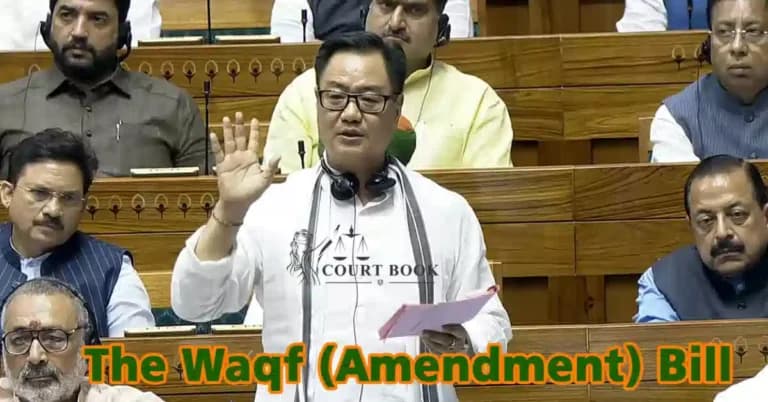The Waqf (Amendment) Bill 2025 has been introduced to bring reforms to the management of Waqf properties across India. Addressing concerns regarding its impact, Union Minister for Minority Affairs, Kiren Rijiju, emphasized in the Lok Sabha that the Bill is prospective in nature and does not have a retrospective effect.
During the discussion, Rijiju countered the speculation that the removal of the ‘waqf by user’ provision would result in the confiscation of Masjid and Dargah properties. He clarified:
"This law is prospective, not retrospective. Please understand this clearly. This law is not to take away anyone's property. This is not to take away anyone's rights."
He assured that properties already registered as Waqf properties before the Bill’s enactment would remain protected. However, properties under dispute with the government would not fall under this safeguard.
Read Also:- Supreme Court Warns Police: Strict Action Against Arrest Norm Violations
Rijiju also addressed concerns regarding ongoing legal disputes over Waqf properties. He stressed that the Bill does not interfere with judicial proceedings:
"If disputes are pending in Courts, how can we remove them by making laws? We can't usurp the power of the Courts."
This statement underscores the government’s stance that judicial verdicts will remain the ultimate authority on such disputes.
A significant concern raised was whether the Bill attempts to take over religious properties. Rijiju clarified that the Bill strictly deals with property management and does not interfere with any religious practices:
"The Bill is not an attempt to confiscate any Muslim religious properties, be it Masjids or Dargahs. It only seeks to ensure better management of Waqf properties."
Read Also:- Karnataka HC Grants Interim Stay on Disciplinary Action Against Advocate
A major amendment in the Bill is the removal of Section 40 of the Waqf Act, which previously allowed the Waqf Board to declare any property as Waqf land. Rijiju criticized this provision:
"Section 40 was a draconian provision. It led to several issues where properties belonging to Hindu temples, Sikh Gurudwaras, Christian families, and even ordinary farmers were declared as Waqf lands."
The removal of this provision aims to prevent potential misuse and unauthorized declarations of properties as Waqf land.
Another key amendment is the proposal to include non-Muslims in Waqf Boards. Rijiju justified this by explaining that the Waqf Board is a statutory body managing properties, and membership should not be restricted by religion:
"Can anyone claim that the Charity Commissioners appointed by the Government to oversee trust properties should belong to their caste or religion?"
The Bill also introduces major reforms concerning women’s rights. It ensures that a person creating a Waqf cannot override inheritance rights of women and children in their family. Rijiju called this a “big reform” and also highlighted the inclusion of women members in Waqf Boards.
Read Also:- Tenants Evicted for Changing Business Use Without Approval, Rules Gujarat HC
Key Provisions of the Waqf (Amendment) Bill 2025:
Application of Limitation Act 1963 to Waqf properties to curb prolonged litigations.
Dispute resolution authority upgraded—higher than the District Collector.
Prohibition on creating Waqf properties in Schedule V and VI areas to protect tribal rights.
Retaining three-member Waqf Tribunal composition as recommended by the Joint Parliamentary Committee.
Introduction of appeal provisions to allow High Courts to hear cases against Waqf Tribunal decisions.
Congress MP Gaurav Gogoi strongly opposed the Bill, arguing that it undermines fundamental rights guaranteed by the Constitution, including freedom of religion. He questioned the removal of the ‘waqf-by-user’ provision, arguing that it was a long-standing recognition by the courts.
Read Also:- 2002 Riots: Gujarat High Court Upholds Acquittal of Six Accused in British Nationals' Killing Case
He criticized the gender representation clause, stating that the 1995 Act already allowed more than two women on the Board, whereas the 2025 Bill limits it to only two.
Gogoi also warned that the Bill could impact ancient Waqf properties, including graveyards that may not have documented records:
"This Bill is against the unity of the nation, the dignity of minorities, peace, and harmony."
Furthermore, he alleged that the Bill is part of an ongoing effort by the government to create fear among minorities and foster societal division:
"This Bill is an attack on the foundation of the Constitution... With this Bill, the government is attempting to dilute the Constitution, defame and disenfranchise the minority community, and create division."















